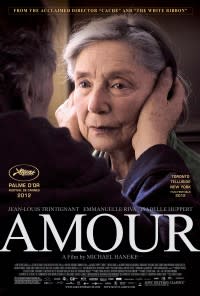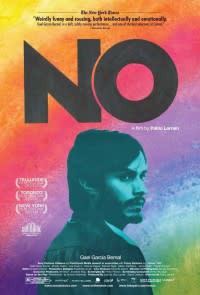Sony Pictures Classics’ Michael Barker And Tom Bernard On Why Oscars Matter
When it comes to Oscar savvy we often hear Harvey Weinstein talked about as the kingpin of the game, but when you look at the success of Sony Pictures Classics you realize it rivals Weinstein, Searchlight, Focus and other comers in consistently, and annually, releasing and nurturing one contender after another in the quest for the elusive statuette of the Academy of Motion Picture Arts & Sciences. Since the company was founded in December 1991, key to its success has been its co-Presidents Michael Barker and Tom Bernard who first worked together in similar specialty divisions at United Artists and Orion and now continue to run one of the most stable indie shops in the industry. But with a total of 25 Oscar wins and 109 nominations just at SPC they clearly have the Midas touch, and that includes a slew of Best Picture nominations for Crouching Tiger, Hidden Dragon (their biggest hit to date), Howard’s End, Capote, An Education, Midnight In Paris and this year’s Amour which won the Palme d’Or in Cannes and has amassed five Oscar nominations including Best Picture and Best Foreign Language Film, only the fifth film in Academy history to be named in both categories. With writing and directing nods for Michael Haneke as well as a realistic Best Actress bid for star Emmanuelle Riva the film looks to be another strong contender for the pair who continue to be one of the few high profile companies that still champions foreign language films. SPC serves up a wide variety of specialty fare of all types and always seems to find a footing in the Oscar race which has become an important part of their business plan. With two contenders for Best Documentary and two for Best Foreign Language Film in addition to the Best Picture bid, the pair are fixtures at every major film festival and are once again making lots of noise in their high season. I spoke to both late last week about the upcoming Oscars and what it means to their bottom line.
Deadline: How important is this Oscar business to the actual business of Sony Pictures Classics?
Bernard: It’s part of the business for Sony Pictures Classics because we can get movies, or have movies, that won’t get the recognition that they deserve any other way. And if they get that recognition what we have found is that the boxoffice and ancillary and profits of these movies get much better. We can go all the way back to Camille Claudel when we had Isabelle Adjani and somebody close to her suggested that you should run a campaign for her for Best Actress and we said ‘it will never happen, no one will watch the movie. We can’t get them to the theatre. And the person said ‘well why don’t you send out VHS cassettes to the Academy’ so we did and sent them to the actors branch and lo and behold we got a nomination. And it took that movie to a level it would have never gotten if it didn’t happen.
Deadline: Do you pick up movies knowing they are specifically going to be in the Oscar race?
Barker: Here’s an example of Amour. We became involved with that film well before it debuted in Cannes. And when we saw how the picture performed in Cannes and the response we immediately thought we had a chance at all these nominations. We don’t buy these films beforehand and say ‘we will definitely have the nominations’ because you never know that. What we do is we assess very early on what we think its chances are. Like when Tom and I saw Junebug at Sundance we walked out of there and both said this young girl, Amy Adams, could get nominated for the Oscar. We felt we had a sense of it. And it was the same for Melissa Leo when we saw the film, Frozen River. Tom and I started the campaign at the very beginning.
Deadline: I remember with Junebug in the summer of 2005 you did something very interesting in the Oscar race that year. You made it the first screener that went out.
Bernard: Yeah. There are lots and lots of strategies in the Oscar race. We try to get people to see the movie. That’s our goal. That was always our main goal. It used to be just to try to get people into the theatres. Now it is to get them to put in your DVD with a stack of 50 DVDs sitting at the house. So if you can get the movie out to them earlier you’ve got a shot. Certainly Amour came with a pedigree with the Palme d’Or prize in Cannes and Michael Haneke we think is considered the best director, if not one of the best directors in the world today, and the Academy certainly understands quality and is aware of quality. This is not your mainstream moviegoing audience. These are people who know the business, they know movies, they pay attention to what is going on around the world. So we felt very confident that we would be able to get them to see that film. And they have and we were so happy to have gotten that many nominations because that means the Academy saw the film.
Barker: A couple of things. One is when Tom and I saw that reaction in Cannes and so many filmmakers came up to us I turned to Tom and said ‘ when Ingmar Bergman made Cries And Whispers and it was nominated for Best Picture and Best Director the Academy has a history that when masterful directors have their moment, they always give them their moment as far as nominations. It’s not like the Academy hasn’t paid attention to movies like this before. We just went out of our way from that point forward to have lots of screenings aimed directly at writers and directors and actors so that we could get them to see it. As far as business is concerned the Academy nominations for this movie gives this film a profile that you could never get otherwise. The picture is doing so well and the profile of these nominations have really helped.
Deadline: Were you worried that the Academy would think it wasn’t even eligible for Best Picture, because this has only happened five times where a foreign language nominee is simultaneously nominated for Best Picture?
Barker: The last time was with us, with Crouching Tiger, Hidden Dragon.
Bernard: I think the Academy has done a great job of making people aware of the rules, and especially this new group that has taken over. I think they’ve done a great job of getting more people to vote than ever before. I got three things in the mail this week telling me to get out and vote. I think that’s great. I think the foreign language film has come of age now. It’s not something no longer in the ghetto. It’s right next to the studio movies in the multi-plex. So I think people are aware it is something that can be voted on in the foreign language category and is something that can compete with the mainstream English language movies. You are going to see more and more movies of that type in the Best Picture category in the future.
Deadline: Do you think the rules should be overhauled so it’s not just the individual countries – which sometimes put politics above art -determining a single entry in Foreign Language Film, or do you like it the way it is?
Barker: That’s a difficult question. I have to say the way the Academy has changed the rules in the last five years has been much better than the way the rules were before. It’s complicated. One film for one country is really good in one sense because you get a lot of these smaller countries represented with films that wouldn’t ordinarily be seen and occasionally get nominated. But the problem comes with countries like France who always have more than one film and we wish there was a way to include those movies that open in the year. But it’s so cumbersome because the numbers of movies are just so many. I don’t really know the answer. We are just really relieved that the Academy keeps improving the process.
Deadline: Do you think the Academy should open up the process of judging the final nominees and send them out on DVD to the entire membership like they have done with Documentaries this year, instead of requiring that you prove you have seen them in theatres?
Bernard: I don’t. We have been involved with a lot of foreign language films over the years. And it is not obvious to everyone in the Academy but this is a major event in the countries these movies are from. And when a movie wins it is like they won at the Olympics. The whole country is celebrating. When our A Separation won last year in Iran there were five million people watching on illegal websites, and what it meant to the people within the country was a real uplift. I think it’s important that the process not be frivolous. It’s important that the people who do go see these movies on a regular basis and see the selection judge the best one. I still think you need to make sure the people who are going to do this are people that are acclimated to these type of films and watch these type of films.
Deadline: You are everywhere this year. You have two films in the Foreign Language contest, No and Amour and two films in Documentary, The Gatekeepers and Searching For Sugar Man. Is it hard to be even handed in campaigning for all of them?
Barker: The key is to push all of them equally. What’s really gratifying is that both The Gatekeepers and No are doing really well so the profile of the nominations is really great.
Bernard: The goal is always just to get the voters to watch the films. The decisions are made by the films. We will see how it plays out. You are not going to see anybody out there that bought an Oscar. I think those days have passed. I see a lot of people trying to buy one right now. But I think the proof will be in the pudding. The quality is going to come through and that is what you are going to see on Sunday night.
Deadline: Do you think the campaigning has any effect? The major studios have been very engaged this year and the money has been flowing.
Barker: Ask us on Monday morning after the Oscars. I think it will be pretty clear.
Bernard: I think the Academy has been moving every year to eliminate the nonsense that happened with Shakespeare In Love and Saving Private Ryan. I think that year (1998) there was an unprecedented amount of time and money spent in Oscar campaigning and they have shortened the amount of campaign time you can have which takes away some manipulation. They have made very stringent rules on what you can send people and so I think the spending is a bit obnoxious to the Academy members and I think they are going to be sending a message this year, not a backlash, but that you can’t buy it.
Deadline: With Amour’s Emmanuelle Riva you have the oldest Best Actress nominee ever.
Barker: We always have felt from the very beginning that she would have a shot. First, both (including Jean-Louis Trintignant) are in the pantheon of great performances. And people are so amazed at their performances, and very much her performance, and the fact that she is the same actress who was in Hiroshima Mon Amour in 1959 just adds to the lore. And she is so excited about coming here for the Oscars. It is going to be her 86th birthday on Sunday, she is the oldest nominee. So it is going to be a very great celebration. It’s really great that her name is on people’s tongues. The BAFTA win for her just really reminds people this is one of those rare and special performances.
Deadline: What do you think about the strong presence of the major studios at the Oscars this year. You are part of one at Sony but usually it has been the specialty divisions like yours or independents like Weinstein that drove the race in recent years.
Barker: That’s a really good sign for all of us because it means that these quality films are not only coming from the independent companies but also the major studios as well. I think there has to be no more of an exciting time for quality films. Last year was a spectacular year for so many great movies, not only independent companies but also the big studios.The fact they are paying attention is good for movies in general.
Deadline: I am sure you are already working on your Oscar blueprint for next year. You’ve been in Sundance and Berlin. What do you have?
Barker: We are very excited about Ralph Fiennes who has directed and is starring as Charles Dickens in a movie called Invisible Woman. We’re very excited about (Sundance pickup) Kill Your Darlings with its excellent cast. We have a few things up our sleeves. In the new Woody Allen film Cate Blanchett gives a terrific performance, a very terrific film we are opening this summer. And of course Before Midnight (also out of Sundance). This is a film we have gotten unanimous raves for and it’s looking good. We open at the end of May. And there are others.
Bernard: The new Almadovar which could make it from Spain.
Barker: And in April we are opening the new Robert Redford movie, The Company You Keep. And At Any Price with Zac Efron and Dennis Quaid from Ramin Bahrani.
Deadline: You have mentioned all these world class filmmakers that you seem to keep working with.
Barker: Ever since Tom and I came together in 1980 or ’81 that was the one thing we had in common together that we would believe in filmmakers and their kind of continuity. And the quality filmmakers were always who inspired us. And that came from Arthur Krim and Eric Pleskow, and Mike Medavoy and Bill Bernstein who ran UA and Orion and it was always the filmmaker who was the driving force.
Bernard: We’ve always said when you want to make a movie with us we don’t ask you who’s in it. We always want to know who the director is and what the script is. Being a director gets you in the door with us.
Deadline: What do you think of this announced sequel to Crouching Tiger, Hidden Dragon? I believe Weinstein is involved with it. Are you?
Bernard: I don’t think Ang Lee is either. Crouching Tiger falls into the category of a script and a director.
Barker: When we did Crouching Tiger we were in the Ang Lee and the James Schamus business.
Deadline: So it is a good time to be Sony Pictures Classics?
Bernard: There are more places to play these movies than ever before. You have AMC and Cinemark and Regal with dedicated screens marketing departments to handle these films, and that’s whether they are speaking French or English. And they’ve got multi-plexes where they want to have it appeal to all audiences at the theatre. We and others who distribute these movies have a place there and it’s not for one week. It’s a place where they can play for awhile. That combined with Landmark Theatres and whatever independents are left out there make it the most robust time for this type of film.
Related stories
OSCARS: Does ‘Amour’ Have A Shot To Make Academy History?
TELLURIDE: Sony Pictures Classics Goes Where Others Don’t With Strong Oscar Slate
Barker & Bernard Get Their Annual Woody: SPC Locks Woody Allen’s ‘Blue Jasmine’
Get more from Deadline.com: Follow us on Twitter, Facebook, Newsletter




